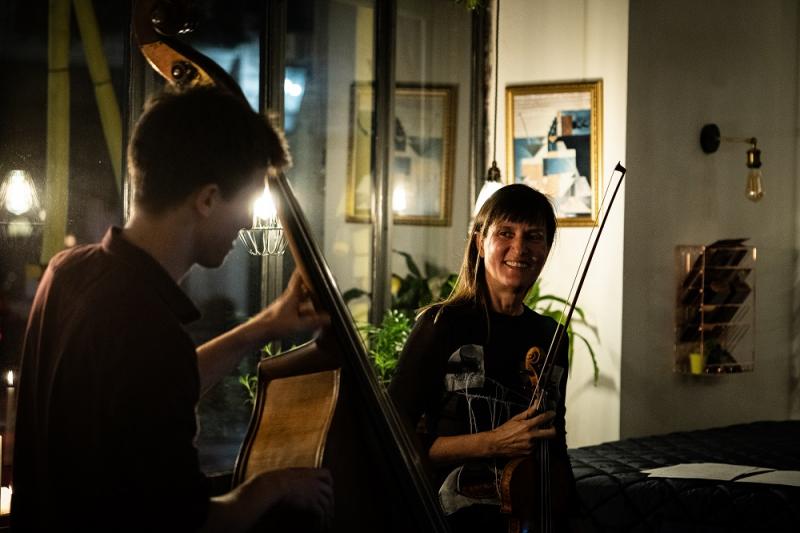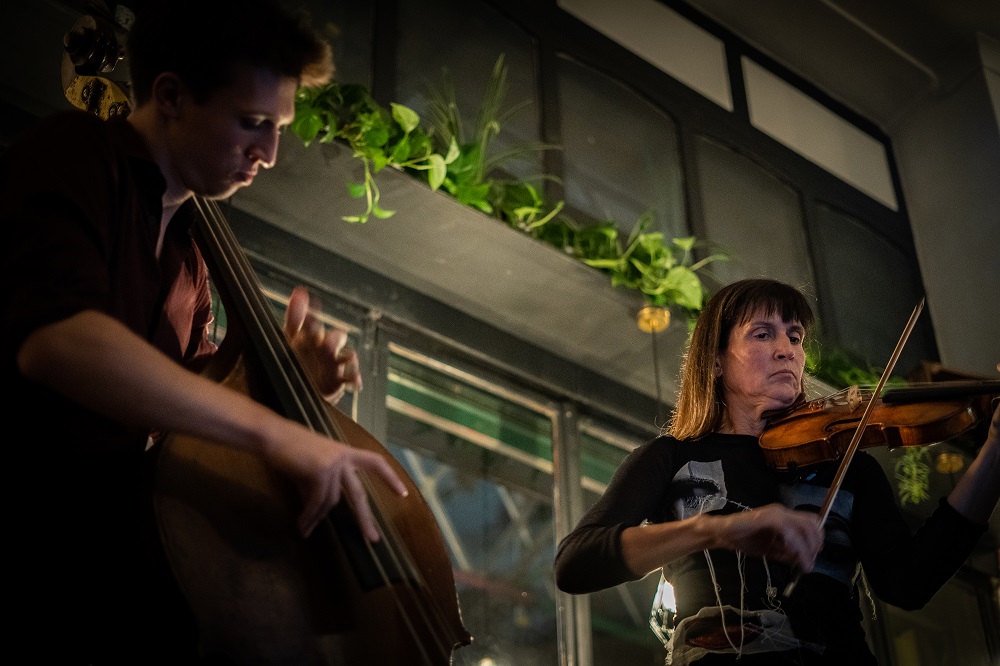Viktoria Mullova, Misha Mullov-Abbado, Fidelio Orchestra Cafe review - a rainbow of brilliant artistry | reviews, news & interviews
Viktoria Mullova, Misha Mullov-Abbado, Fidelio Orchestra Cafe review - a rainbow of brilliant artistry
Viktoria Mullova, Misha Mullov-Abbado, Fidelio Orchestra Cafe review - a rainbow of brilliant artistry
The great violinist and her double-bassist son bring light and life to a varied programme

There should eventually be a plaque on the outside of the Fidelio Orchestra Café in Farringdon, to the effect that London’s musical life after lockdown re-ignited here. And how, in early July, with Steven Isserlis exuberantly stepping up to play Bach before a rapt small audience.
What’s changed since the summer? The fact that concerts now begin in candlelight, and half an hour earlier, at 7pm, to accommodate a prompt 10pm closure; no more, for now, the kind of spontaneous post-event joy in playing ever more, such as happened when Pavel Kolesnikov and Samson Tsoy played violin sonatas with Alina Ibragimova into the small hours. But every guest appearance has its own distinct flavour, and this one, following on the heels of a recording, saw mother and son playing together live for the first time this year.
Listened to attentively before the usual excellent meal served by Alan Rosenthal, the programme was ideal for the space and ambience: a mix of mellow, visceral and even profound. Mullov-Abbado, despite his Italian-Russian parentage, is a cool young London dude recently graduated from the Royal Academy of Music, very likable; his compositions are sui generis, no pale crossover between classical and jazz. Some are easy to grasp, but not long in to the concert, Brazil gave us an edge-of-seat unpredictability which reminded me of the quartet works of Caroline Shaw. There’s total musical unanimity between bass and violin, with some heart-leaping synchonisations in changing rhythms and missed beats. Mullova, as always, seems cool if you just look at her, but the sounds tell a different story; when she speaks, it’s with a rather beautiful intonation and a shyness which seems to seek backing from her son.  There were two very different cores to the repertoire: the faster movement of two from Bach’s B minor Sonata, in which Mullov-Abbado’s fast and furious realization of the bass meeting the lyric line above proved phenomenal, and one of the Brazilian numbers which punctuated the evening, Caico, which Mullova cited as being especially close to her heart; the way she played it, with inward beauty, proved the point.
There were two very different cores to the repertoire: the faster movement of two from Bach’s B minor Sonata, in which Mullov-Abbado’s fast and furious realization of the bass meeting the lyric line above proved phenomenal, and one of the Brazilian numbers which punctuated the evening, Caico, which Mullova cited as being especially close to her heart; the way she played it, with inward beauty, proved the point.
Her son’s composing has exuberant wit, too: impossible not to laugh out loud at his audacity in the mad waltz of Little Astronaut. Its counterpart in the post-dessert encore, Estonian composer Lepo Sumera’s pastiche waltz for the cartoon Spring Fly, proved almost as wacky in the interpretation. I’ve probably heard that piece more than any other in live performance over the past decade, thanks to Paavo Järvi’s use of it as an encore calling-card with his Estonian Festival Orchestra at least twice every Pärnu Festival. Which is where Mullova, having given a phenomenal interpretation of the Sibelius Violin Concerto there, first heard it. She and her son gave it a wonderful twist last night, and then embraced with obvious joy, cheek to cheek. No doubting the warmth in all that; and I could happily sit through the whole thing again.
- One more performance tonight (1 October; sold out). Future performers at the Fidelio Orchestra Cafe include Angela Hewitt and Nicola Benedetti
- More classical reviews on theartsdesk
rating
Explore topics
Share this article
The future of Arts Journalism
You can stop theartsdesk.com closing!
We urgently need financing to survive. Our fundraising drive has thus far raised £49,000 but we need to reach £100,000 or we will be forced to close. Please contribute here: https://gofund.me/c3f6033d
And if you can forward this information to anyone who might assist, we’d be grateful.

Subscribe to theartsdesk.com
Thank you for continuing to read our work on theartsdesk.com. For unlimited access to every article in its entirety, including our archive of more than 15,000 pieces, we're asking for £5 per month or £40 per year. We feel it's a very good deal, and hope you do too.
To take a subscription now simply click here.
And if you're looking for that extra gift for a friend or family member, why not treat them to a theartsdesk.com gift subscription?
more Classical music
 theartsdesk at the Lahti Sibelius Festival - early epics by the Finnish master in context
Finnish heroes meet their Austro-German counterparts in breathtaking interpretations
theartsdesk at the Lahti Sibelius Festival - early epics by the Finnish master in context
Finnish heroes meet their Austro-German counterparts in breathtaking interpretations
 Classical CDs: Sleigh rides, pancakes and cigars
Two big boxes, plus new music for brass and a pair of clarinet concertos
Classical CDs: Sleigh rides, pancakes and cigars
Two big boxes, plus new music for brass and a pair of clarinet concertos
 Waley-Cohen, Manchester Camerata, Pether, Whitworth Art Gallery, Manchester review - premiere of no ordinary violin concerto
Images of maternal care inspired by Hepworth and played in a gallery setting
Waley-Cohen, Manchester Camerata, Pether, Whitworth Art Gallery, Manchester review - premiere of no ordinary violin concerto
Images of maternal care inspired by Hepworth and played in a gallery setting
 BBC Proms: Barruk, Norwegian Chamber Orchestra, Kuusisto review - vague incantations, precise laments
First-half mix of Sámi songs and string things falters, but Shostakovich scours the soul
BBC Proms: Barruk, Norwegian Chamber Orchestra, Kuusisto review - vague incantations, precise laments
First-half mix of Sámi songs and string things falters, but Shostakovich scours the soul
 BBC Proms: Alexander’s Feast, Irish Baroque Orchestra, Whelan review - rapturous Handel fills the space
Pure joy, with a touch of introspection, from a great ensemble and three superb soloists
BBC Proms: Alexander’s Feast, Irish Baroque Orchestra, Whelan review - rapturous Handel fills the space
Pure joy, with a touch of introspection, from a great ensemble and three superb soloists
 BBC Proms: Moore, LSO, Bancroft review - the freshness of morning wind and brass
English concert band music...and an outlier
BBC Proms: Moore, LSO, Bancroft review - the freshness of morning wind and brass
English concert band music...and an outlier
 Willis-Sørensen, Ukrainian Freedom Orchestra, Wilson, Cadogan Hall review - romantic resilience
Passion, and polish, from Kyiv's musical warriors
Willis-Sørensen, Ukrainian Freedom Orchestra, Wilson, Cadogan Hall review - romantic resilience
Passion, and polish, from Kyiv's musical warriors
 BBC Proms: Faust, Gewandhausorchester Leipzig, Nelsons review - grace, then grandeur
A great fiddler lightens a dense orchestral palette
BBC Proms: Faust, Gewandhausorchester Leipzig, Nelsons review - grace, then grandeur
A great fiddler lightens a dense orchestral palette
 BBC Proms: Jansen, Royal Concertgebouw Orchestra, Mäkelä review - confirming a phenomenon
Second Prom of a great orchestra and chief conductor in waiting never puts a foot wrong
BBC Proms: Jansen, Royal Concertgebouw Orchestra, Mäkelä review - confirming a phenomenon
Second Prom of a great orchestra and chief conductor in waiting never puts a foot wrong
 BBC Proms: Royal Concertgebouw Orchestra, Mäkelä review - defiantly introverted Mahler 5 gives food for thought
Chief Conductor in Waiting has supple, nuanced chemistry with a great orchestra
BBC Proms: Royal Concertgebouw Orchestra, Mäkelä review - defiantly introverted Mahler 5 gives food for thought
Chief Conductor in Waiting has supple, nuanced chemistry with a great orchestra
 Dunedin Consort, Butt / D’Angelo, Muñoz, Edinburgh International Festival 2025 review - tedious Handel, directionless song recital
Ho-hum 'comic' cantata, and a song recital needing more than a beautiful voice
Dunedin Consort, Butt / D’Angelo, Muñoz, Edinburgh International Festival 2025 review - tedious Handel, directionless song recital
Ho-hum 'comic' cantata, and a song recital needing more than a beautiful voice
 Classical CDs: Dungeons, microtones and psychic distress
This year's big anniversary celebrated with a pair of boxes, plus clarinets, pianos and sacred music
Classical CDs: Dungeons, microtones and psychic distress
This year's big anniversary celebrated with a pair of boxes, plus clarinets, pianos and sacred music

Add comment